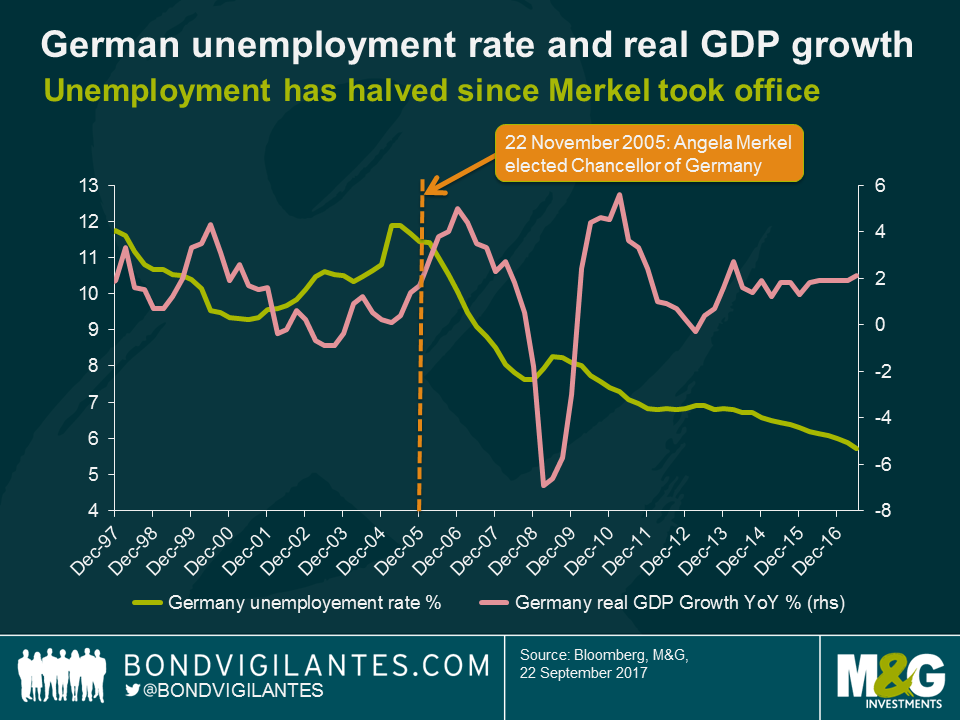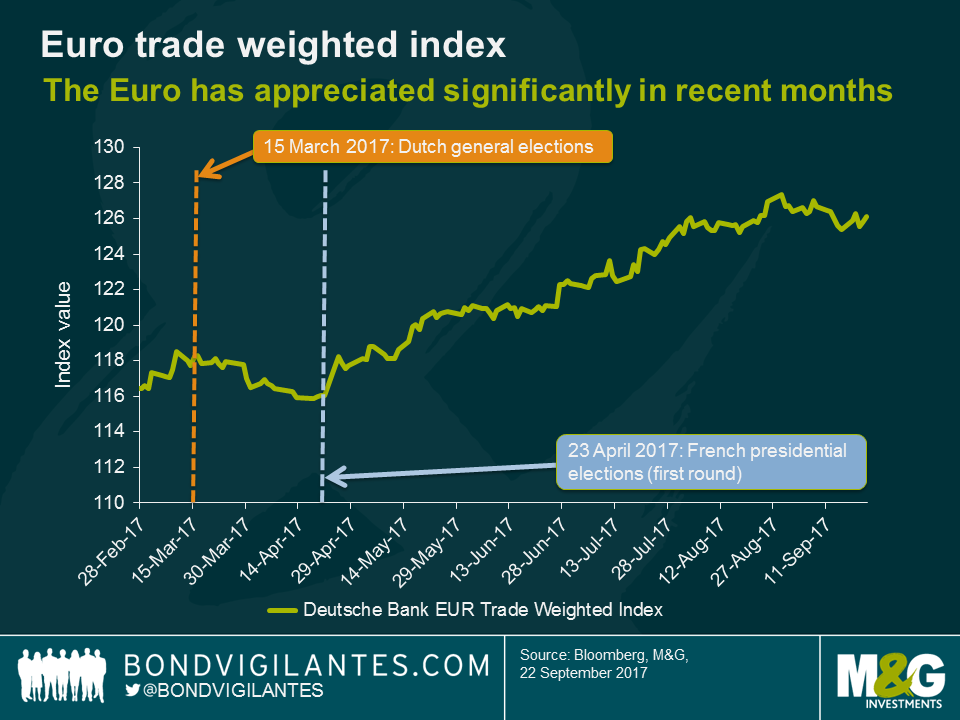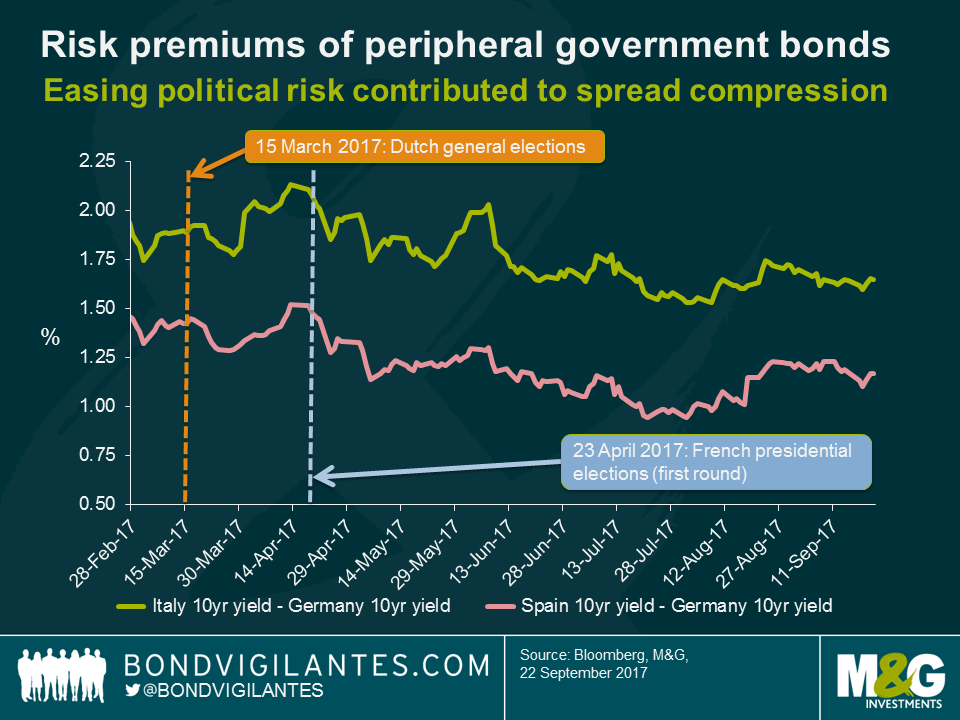Angela Merkel’s Pyrrhic victory
And they say German elections are boring… As the preliminary results are in, here are our three key takeaways.
(1) Merkel goes fourth
First things first, as expected Angela Merkel has won the election. Her CDU, in combination with its Bavarian sister party CSU, is going to remain the largest faction in parliament (33.0% of votes combined). All roads lead to a fourth term for her as chancellor. This didn’t come as a surprise, of course, particularly considering the strength of the German economy. The unemployment rate has halved since Merkel first took office in November 2005 and GDP growth is above 2%.
However, this is not the main story. The CDU/CSU experienced severe losses, dropping by 8.5% compared to the 2013 elections, which is all the more significant considering the strong economic backdrop, which should actually have been a tailwind for Merkel as the incumbent chancellor. Two factors might have played a key role: “Merkel fatigue” – after twelve years in office many voters probably thought it was time for a change of management. Furthermore, her handling of the refugee / immigration crisis has alienated voters at the conservative end of the political spectrum.
(2) Game of coalitions
Merkel’s current coalition partner had a pretty rough night, too. The SPD only got 20.5% in the election, a new record low. They were quick to rule out a continuation of the so-called grand coalition with Merkel’s CDU/CSU. This would follow some logic, of course. Both ruling blocs – CDU/CSU and SPD – are facing significant losses, which doesn’t seem like a particularly strong mandate for “business as usual”. Establishing themselves as a strong opposition leader might also help the SPD position themselves as a credible alternative to the CDU/CSU in the next elections. Time will tell whether they are genuinely willing to give up power and leave the coalition or whether they are merely playing hardball to improve their bargaining position in coalition negotiations.
Apart from a grand coalition, the only other realistic option would be a “Jamaica coalition” between CDU/CSU, FDP and Green Party – it’s called this because the combined black, yellow and green party colours match those of the Caribbean island’s flag. This coalition has happened before in German state parliaments, for example currently in Schleswig-Holstein, but there are certainly major obstacles on a federal level. The Green Party has ideological differences with the liberal FDP (economic policy, tax reform, etc.) and the conservative wing of the CDU/CSU (immigration policy, social issues, etc.). This could make a Jamaica coalition rather instable and pre-occupied with infighting.
Whether we end up with a grand or a Jamaica coalition in the end, negotiations are going to be tough either way and might drag on for a while. This clearly weakens Merkel’s position both inside Germany and abroad. She might get challenged by French president Emmanuel Macron for the unofficial leadership role within the EU. If he is able to seize the moment, this would make Eurozone debt mutualisation and the creation of a European finance minister more likely, at least in the medium term. Merkel’s rumoured plan to install Jens Weidmann, the current President of the Bundesbank, as new ECB President after Draghi’s term ends in 2019, seems less realistic today. This increases the odds of a continuation of the ECB’s expansive policy stance.
(3) Populism is back with a vengeance
One of the most striking election results is certainly the strong performance of the right-wing nationalist AfD (12.6%). Not only is the party entering the German Bundestag for the first time but the AfD is going to become the third largest faction in parliament. If the grand coalition is continued – which can’t be ruled out entirely at this point – the AfD would de facto become the opposition leader. While this is certainly noteworthy, to say the least, the direct political implications are likely to be minimal. None of the other parties is going to form a coalition with them and AfD members of parliament are likely to be treated as political pariahs. We have seen this happening in German state parliaments many times before.
However, I think there might be two important indirect consequences of the AfD’s electoral success. First, within Germany the pressure on Merkel, not least from her own party, with regards to policy changes is going to build up. For obvious reasons, preventing the rise of a right-wing nationalist movement has been a central dogma in German politics. That’s out of the window now after the AfD’s double digits score last night – on Merkel’s watch. In the past, she has been willing to revise long-held positions (on nuclear power, the minimum wage, same sex marriage etc.) when she felt that sentiment amongst voters was shifting. In order to prise back votes from the AfD she might change tack again, possibly turning more conservative, with a stricter stance on migration, EU centralisation and so on.
Secondly, the success of the AfD at the ballot box might challenge the prevailing narrative, particularly since the Dutch and French elections, that anti-EU populism is on the decline. This could have implications for markets, which arguably have become somewhat complacent in this regard. The Euro, which has been going from strength to strength in recent months, might get under pressure. Compressed peripheral risk premiums for government and corporate bonds might widen again, considering that there are more political events on the horizon, namely the Catalan independence referendum as well as elections in Austria and Italy.
The value of investments will fluctuate, which will cause prices to fall as well as rise and you may not get back the original amount you invested. Past performance is not a guide to future performance.


18 years of comment
Discover historical blogs from our extensive archive with our Blast from the past feature. View the most popular blogs posted this month - 5, 10 or 15 years ago!


Bond Vigilantes
Get Bond Vigilantes updates straight to your inbox








